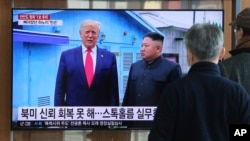The personal relationship between North Korean leader Kim Jong Un and U.S. President Donald Trump has no impact on Pyongyang’s denuclearization stance toward Washington, said experts.
"The recent North Korean statement responding to Trump’s birthday card was very clear," said Robert Manning, a senior fellow at the Atlantic Council. "The personal feelings between Trump and Kim have no bearing on DPRK policy."
The DPRK stands for the Democratic People’s Republic of Korea, the official English name for North Korea.
Over the past two years, Trump has attempted to parlay his personal relationship with Kim into a breakthrough on denuclearization talks. Pyongyang dismissed that gambit over the weekend, dimming hopes that negotiations with Washington would resume based on the two leaders’ personal chemistry.
Kim Kye Gwan, advisor to North Korea’s Foreign Ministry, said, "As acknowledged by the world, it is true that the personal relationship between Chairman of our State Affairs Commission [Kim] and President Trump are not bad."
He continued, "But it is absentminded to think of either making us return to the dialogue with the U.S. by taking the advantage of such relationships or creating an atmosphere for it."
The Korean Central News Agency, North Korea’s state media, issued the statement on Saturday.
Ken Gause, director of the Adversary Analytics Program at CNA, said the remarks do not mean that Kim will end his personal relationship with Trump but suggested, "Trump can’t trade on that relationship to get denuclearization or maybe even a freeze on testing."
Throughout the Trump administration’s diplomatic outreach to Pyongyang that began in 2018, Trump has touted his personal relationship with Kim, which culminated in an exchange of letters between the two.
"I was really tough and so was he, and we went back and forth," Trump told supporters at a West Virginia rally on September 30, 2018, months after he met Kim for the first time in Singapore. "And then we fell in love, OK? No, really, he wrote me beautiful letters, and they’re great letters. We fell in love." In December, Trump said his relationship with Kim is "very good" even though no progress had been made on denuclearization and despite threats North Korea raised by conducting 13 missile launches last year.
Bruce Klingner, former CIA deputy division chief for Korea and a current senior research fellow at the Heritage Foundation, said, "North Korea’s statement shows that the personal relationship that President Trump touted so highly was irrelevant to altering Pyongyang’s decades-long quest to be a nuclear weapons state."
Trump has met three times with Kim: in Singapore in June 2018, in Hanoi in February, and at an impromptu summit at the inter-Korean border in June. But denuclearization talks have remained deadlocked since the working-level talks held in Stockholm broke down in October.
White House National Security Adviser Robert O’Brien said that Washington has "reached out to the North Koreans" to resume the negotiations that collapsed in Stockholm "through various channels" in an interview with Axios on Sunday.
Manning, however, said the statement by Kim’s top advisor indicates that Kim has decided not to negotiate with the U.S. because the talks and his personal relationship with Trump have not brought any concessions from Washington.
"Kim has made a strategic choice," said Manning. "Kim prefers his nuclear weapons," and decided that the U.S. is "highly unlikely to make the concessions [the North Koreans] want."
Kim’s Foreign Ministry advisor, Kim Kye Gwan, said in the KCNA statement that Pyongyang will resume a dialogue with the U.S. under one condition---if Washington "unconditionally accept our demands."
Since the failed Hanoi Summit in February, North Korea has demanded that the U.S. relax sanctions imposed on the country.
Kim’s advisor said in his statement that North Korea’s offer to close down a main nuclear facility at Yongbyon in exchange for sanctions relief made at the Hanoi Summit is no longer valid.
"There will never be such negotiations as that in Vietnam, in which we proposed exchanging a core nuclear facility for the lifting of some U.N. sanctions," said Kim Kye Gwan.
Klingner said, "Pyongyang’s demands remain constant, for the U.S. to capitulate to regime demands if Washington wants to have another nuclear agreement."
Gause said, "The U.S. will have to provide concessions to restart negotiations," adding, "Birthday greetings won’t get it done."
Gause does not expect Trump to "offer concessions to restart negotiations until he feels emboldened domestically."
Gause said, "That is not likely to happen until and unless he is re-elected." He continued, "I don’t expect major progress on the relationship until 2021, provided Trump is re-elected."
Trump is aiming for his second term as president in the upcoming election in November. But his re-election prospects are clouded by the impeachment trial Trump is expected to face by the Senate after the House votes this week to transmit the article of impeachment to the Senate.




